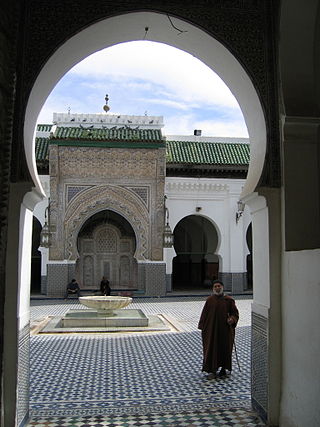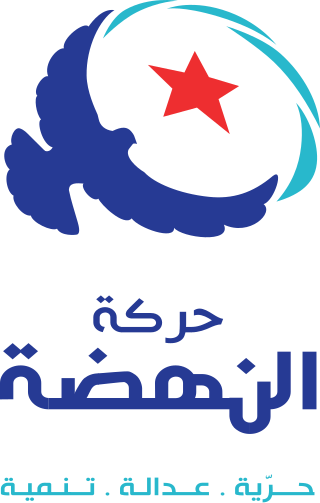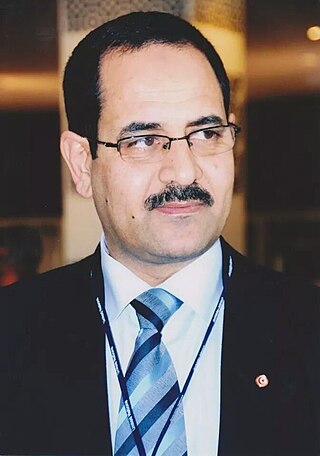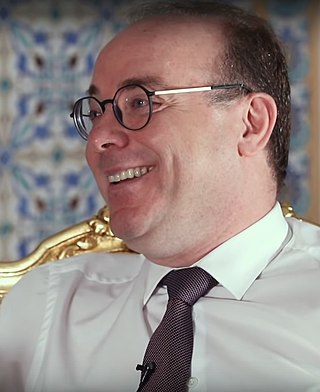
Energy development is the field of activities focused on obtaining sources of energy from natural resources. These activities include the production of renewable,nuclear,and fossil fuel derived sources of energy,and for the recovery and reuse of energy that would otherwise be wasted. Energy conservation and efficiency measures reduce the demand for energy development,and can have benefits to society with improvements to environmental issues.
Muhammad VIII al-Amin commonly known as Lamine Bey,was the last Bey of Tunis,and also the only King of Tunisia.

Tunisian independence was a process that occurred from 1952 to 1956 between France and an independence movement,led by Habib Bourguiba. He became the first Prime Minister of the Kingdom of Tunisia after negotiations with France successfully brought an end to the colonial protectorate and led to independence.

Engie SA is a French multinational electric utility company,headquartered in La Défense,Courbevoie. Its activities cover electricity generation and distribution,natural gas,nuclear power,renewable energy,and the petroleum industry. It is involved in both upstream and downstream activities.
Énergir,formerly known as Gaz Métro,is an energy company with 535,000 customers in Quebec and the northeastern United States. It is the largest natural gas distribution company in Quebec,and,through subsidiaries,also produces electricity from wind. In the United States the company operates through subsidiaries in seventeen states,where it produces electricity from hydroelectric,wind and solar sources,in addition to being the leading electricity distributor and the sole natural gas distributor in Vermont.

EnergyinSaudi Arabia involves petroleum and natural gas production,consumption,and exports,and electricity production. Saudi Arabia is the world's leading oil producer and exporter. Saudi Arabia's economy is petroleum-based;oil accounts for 90% of the country's exports and nearly 75% of government revenue. The oil industry produces about 45% of Saudi Arabia's gross domestic product,against 40% from the private sector. Saudi Arabia has per capita GDP of $20,700. The economy is still very dependent on oil despite diversification,in particular in the petrochemical sector.

This article describes the energy and electricity production,consumption and import in Egypt.

Science and technology in Morocco has significantly developed in recent years. The Moroccan government has been implementing reforms to encourage scientific research in the Kingdom. While research has yet to acquire the status of a national priority in Morocco,the country does have major assets that could transform its R&D sector into a key vehicle for development. The industry remains dominated by the public sector,with the universities employing 58% of researchers. Morocco's own evaluation of its national research system –carried out in 2003 –revealed that the country has a good supply of well trained high quality human resources and that some laboratories are of very high quality. However,the greatest gap at that point of time lied in the link between research and innovation. The educational qualifications of Moroccan researchers have increased significantly since the early 1990s. The University of Al-Karaouine is considered the oldest continuously operating academic degree-granting university in the world.

The energy policy of the Obama administration was defined by an "all-of-the-above" approach which offered federal support for renewable energy deployment,increased domestic oil and gas extraction,and export of crude oil and natural gas. His presidency's first term was shaped by the failure of his signature climate legislation,the American Clean Energy and Security Act,to pass,and then climate and energy disasters including the Deepwater Horizon oil spill in 2010 and then Hurricane Sandy,which took place during the 2012 election. In his second term,Obama lifted the ban on crude oil exports and approved liquified natural gas exports;his planned regulatory approach to reducing greenhouse pollution in the electricity sector,the Clean Power Plan,was blocked by the U.S. Supreme Court.

Presidential elections were held in Tunisia on 23 November 2014,a month after parliamentary elections. They were the first free and fair presidential elections since the country gained independence in 1956,and the first direct presidential elections after the Tunisian Revolution of 2011 and the adoption of a new Constitution in January 2014.

The Ennahda Movement,also known as the Renaissance Party or simply known as Ennahda,is a self-defined Islamic democratic political party in Tunisia.
Energy in Algeria encompasses the production,consumption,and import of energy. As of 2009,the primary energy use in Algeria was 462 TWh,with a per capita consumption of 13 TWh. Algeria is a significant producer and exporter of oil and gas and has been a member of the Organization of the Petroleum Exporting Countries (OPEC) since 1969. It also participates in the OPEC+ agreement,collaborating with non-OPEC oil-producing nations. Historically,the country has relied heavily on fossil fuels,which are heavily subsidized and constitute the majority of its energy consumption. In response to global energy trends,Algeria updated its Renewable Energy and Energy Efficiency Development Plan in 2015,aiming for significant advancements by 2030. This plan promotes the deployment of large-scale renewable technologies,such as solar photovoltaic systems and onshore wind installations,supported by various incentive measures.

Hamadi Jebali is a Tunisian engineer,Muslim politician and journalist who was Prime Minister of Tunisia from December 2011 to March 2013. He was the Secretary-General of the Ennahda Movement,a moderate Islamic party in Tunisia,until he left his party in December 2014 in the course of the 2014 Tunisian presidential election.
Energy use and development in Africa varies widely across the continent,with some African countries exporting energy to neighbors or the global market,while others lack even basic infrastructures or systems to acquire energy. The World Bank has declared 32 of the 48 nations on the continent to be in an energy crisis. Energy development has not kept pace with rising demand in developing regions,placing a large strain on the continent's existing resources over the first decade of the new century. From 2001 to 2005,GDP for over half of the countries in Sub Saharan Africa rose by over 4.5% annually,while generation capacity grew at a rate of 1.2%.

Ridha Saidi is a Tunisian politician. He serves as the Minister of Economy under Prime Minister Hamadi Jebali.

Riadh Bettaieb is a Tunisian politician. He serves as the Minister of Investment and International Cooperation under Prime Minister Hamadi Jebali.

Mohamed Salmane is a Tunisian politician. He serves as the Minister of Housing and Equipment under Prime Minister Hamadi Jebali.

Elyes Fakhfakh is a Tunisian politician. He served as the Minister of Tourism and,starting on 19 December 2012,as the Minister of Finances as well,under Prime Minister Hamadi Jebali. He served as the Prime Minister of Tunisia from 27 February to 2 September 2020.

Chokri Belaïd,also transliterated as Shokri Belaïd,was a Tunisian politician and lawyer who was an opposition leader with the left-secular Democratic Patriots' Movement. Belaïd was a vocal critic of the Ben Ali regime prior to the 2011 Tunisian revolution and of the then Islamist-led Tunisian government. On 6 February 2013,he was fatally shot outside his house in El Menzah,close to the Tunisian capital,Tunis. As a result of his assassination,Tunisian Prime Minister Hamadi Jebali announced his plan to dissolve the existing national government and to form a temporary "national unity" government.

Mehdi Jomaa is a Tunisian engineer and was the acting Prime Minister of Tunisia from 29 January 2014 to 6 February 2015. He was chosen on 14 December 2013. Jomaa was Minister of Industry in the Ali Laarayedh government.
















